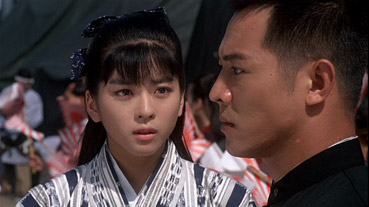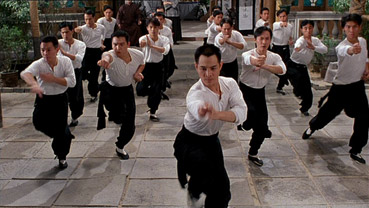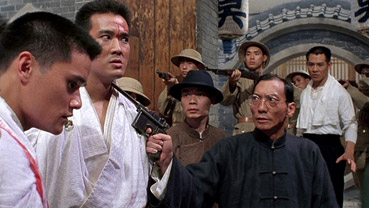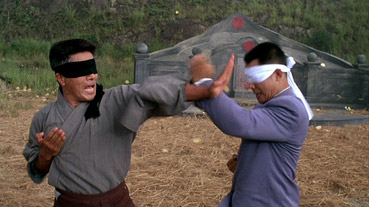|
The Chinese and the Japanese, as you may be aware, have not always been the best of friends. The brutality of the Japanese occupation of China during the 1937-45 Sino-Japanese war still resonates with many older Chinese – a friend of mine with a love of Japanese culture rarely gets to travel to Japan because of the resentment his Chinese wife still harbours over the mistreatment of her family by the occupying forces during this period.
It's certainly made its mark on Hong Kong action cinema and just recently underwent a rather dispiriting revival as the weakest component of the otherwise impressive Ip Man. This lasting antagonism towards the Japanese was also central to two of the genre's finest films, Hapkido and Fist of Fury (both 1972), the first of which starred the wonderful Angela Mao, while the second was a showcase for the extraordinary fighting skills of a certain Bruce Lee. I mention these two specifically not just because of their similarity to each other, but also to the 1994 Fist of Legend, the film under review here. The plots of all three are built around a rivalry between Japanese and Chinese martial arts schools, all feature some blisteringly choreographed fights and a key genre figure in the lead, and all cast the Japanese as the bad guys. Mind you, that fact that Fist of Legend is actually a remake of Fist of Fury (the clue's in the title) does explain a lot. The real difference with the newer film is one of time and changing attitudes, resulting in a more even-handed approach than you'll find in the earlier works (or indeed the recent Ip Man), which gives the characters and story development a little more depth than we're used to seeing in this genre.

The story is set in 1937, and the hostility between the two nations is clearly signalled in the opening scene, when a group of militant Japanese martial artists known as the Black Dragon Clan storm into Kyoto University and demand that good-hearted Chinese student Chen Zhen (Jet Li) be removed from campus. When he refuses to leave, they attempt to forcibly eject him and get beaten senseless in a blizzard of violent blows and bone twisting, a sequence clearly influenced by a key scene in Kurosawa's Red Beard (a classic Japanese movie – oh, the irony). It's a given in Hong Kong genre cinema that Chinese martial arts are always superior to their Japanese equivalent; there'll be one exception, of course, a Japanese fighter who will have developed a technique that's as brutal as it is technically impressive, but he'll always end up cheating and get beaten regardless. But I'm getting ahead of myself.
Following this fight, the Black Dragon master arrives in the shape of Funakoshi Fuimo (played by the widely respected Kurata Yasuaki), who resets a couple of dislocations, reprimands his men for using violence, and tells them they were lucky their opponent was in a merciful mood. When Zhen tells Funakoshi that he was raised and taught by master Huo Yuan Jia, Funakoshi reveals that Huo has just been killed by a Black Dragon fighter named Ryuichi Akutagawa (Jackson Liu) in a challenge match in Shanghai. The loss of such a skilled master saddens Funakoshi, the second sign that the racial conflict is not going to be painted in purely diametric terms. The first is that Zhen's girlfriend is pretty Japanese classmate Yamada Mitsuko (Nakayama Shinobu), a relationship that's destined to meet with hostile disapproval from both racial camps.
Back in Shanghai, Zhen makes a surprise appearance at Huo's funeral, destroys a plaque bearing the Chinese character for 'tolerance' and pops round to Akutagawa's martial arts school to give Akutagawa and his boys a serious pasting, a scene that directly mirrors its predecessor in Fist of Fury, right down to some of the chosen camera angles. It's faster and bigger than Lee's glorious battle and almost as cool. Almost. I'll get to why in a minute. What it does confirm is that a fighter of Akutagawa's limited capabilities could never have beaten Huo and that his death was more likely the result of foul play. Zhen goes on to prove his theory by having Hou's body exhumed and removing his liver so that the inventively named Doctor Smith (he's English, you see) can test it for toxins. And he finds plenty.

For a while it looks as if this is going to be another case of honourable Chinese verses black-hearted Japs, with the local police stuck somewhere in the middle. This all changes when Zhen is framed for Akutagawa's murder and Mitsuko testifies that he spent the night in question in her hotel room. And they weren't sleeping, if you know what I mean. With the identity of Zhen's girlfriend now out in the open, it's the turn of the Chinese to be intolerant and judgemental, and Zhen is soon pressured to choose between this Japanese girl and his position as new head of Huo's Jing Wu Men school. Smart man that he is, he opts for the former and departs with Matsuko to live in an run-down hut near Huo Yuan Jia's grave, leaving the school in the slightly less capable hands of Huo's son, Hou Ting-an (Chin Siu-hou). This more balanced approach to a long-standing conflict peaks when Funakoshi turns up for a one-on-one fight with Zhen and what would usually be a to-the-death grudge match becomes a learning experience for them both. It's also down to Funakoshi to remind Zhen why they actually practice martial arts and point out that if you really want to kill your opponent then you're better off using a gun.
All of which gives the characters and narrative of Fist of Legend considerably more substance than usual for the genre. This is aided by a charismatic central performance from Jet Li, some brief but memorable moments of character humour, and solid support from Chin Siu-hou, Nakayama Shinobu and (especially) Kurata Yasuaki. Yuen Woo-ping's down-and-dirty fight choreography is consistently excellent and energised further by Derek Wan's mobile camera, resulting in a string of show-stopping old school set-pieces in which impacts have physical consequence and wire-work is kept to a largely invisible minimum. It's thus a bit of a shame that director Gordon Chan chose to accelerate the action further by intermittently cranking up the film speed, a common enough practice in martial arts cinema and largely effective if used with care, but it's just too visible here to ignore. This may be a small thing, and one that clearly hasn't bothered most fans, but for me it detracts from the skills of the performers, sharply reminding me that I'm watching a movie and momentarily transforming an action sequence into a cartoon. The shots in question are thankfully brief and infrequent, but I'd be happier if they weren't there at all – these guys can move fast enough without such technical assistance. If this stops Fist of Legend from making my kung-fu favourites list, it's not by much. It has a terrific cast, excellent fight choreography, a more complex and layered plot than the genre norm, and it gets to have its cake and eat it in the handling of the Sino-Japanese conflict, which it plays on, usurps, then returns to for a storming climactic fight with the inevitable, seemingly indestructible Japanese brute (splendidly played by a hard-as-nails Billy Chow). For many the film is a genre masterpiece, but though I'm happy to champion its many considerable qualities, I still prefer the original...
And the 16:9 demon strikes again. No problems at all with the picture quality, which while not quite as eye-poppingly gorgeous as last year's release of the older King Boxer, is well up to Dragon Dynasty's usual high standards – the image is sharp, the contrast well balanced, and there's some rich colour reproduction when the costumes or sets demand it, although the palette here is toned down a little on its 70s cousins. Like so many DVD transfers of late, however, the 1.85:1 image has been slightly cropped (or perhaps opened out) to completely fill the 16:9 screen. It's a small thing perhaps, but such pandering to the black bar moaners always irks.

Full marks for including all three available soundtracks here, with the original Cantonese and Mandarin stereo tracks joined by a newer English language 5.1 redub. As you'd expect, the 5.1 mix is sonically superior, boasting a clarity and spread that leaves the original tracks standing, but that's about where its advantages end. It's clear from the matching of words to mouth movements that the dialogue was performed in Cantonese, and this is far and away the best track on offer. It's not just because of the dialogue synchronisation (it's still likely post-dubbed, but is a far closer match than the Mandarin or English tracks), but also because all of the Japanese and English dialogue on this track is performed by the original actors in the language in question (the exception being when Funakoshi speaks in Cantonese, which has clearly been voiced by a completely different actor), which really strengthens the film's cross-cultural elements. On the Mandarin track, all the dialogue has been dubbed in that language, regardless of whose mouth it emerges from. Even that is preferable to the English track, however, not just for the incongruous modern American voices and accents, but also because the music has once again been re-scored to more closely match what those who had nothing to do with the film's production believe an international audience will better respond to.
On Disc 1 we have...
Audio Commentary by Bey Logan
The affable and supremely knowledgeable Bey Logan takes us on a typically fact and trivia-packed trip through just about every aspect of the production, with detail provided on the locations, the costumes, the period and location specific details, the actors (brief biographies are provided even for small roles) and just about anything else you might want to know about the film. As genre fans will know, Logan really knows his stuff, but never comes across as smug or superior and always sounds like he's sharing the information out of sheer enthusiasm for his subject.
The rest of the extras are all on Disc 2.
The Man Behind the Legend – an exclusive interview with director Gordon Chan (35:36)
The engagingly self-effacing Chan recalls the process of remaking Fist of Fury, the incident that led to a more realistic approach to the fight sequences, working with actors Jet Li, Kurata Yasuaki, Chin Siu-hou and Billy Chow, and more. The film apparently did not do that well on its release, something he blames on the increasing audience fascination with CG imagery and a shift towards wushu in martial arts cinema, and thus was got a serious surprise at Cannes when a group of French fans began bowing down before him because of his work on this very film. "For me," he says, "it's just another kung-fu movie," though does hold it in fond regard and observes that with the rise of wire work and CGI we'll probably never see it's like again.

Brothers in Arms – an exclusive interview with kung-fu impresario Chin Siu-ho (23:19)
Actor and martial artist Chin Siu-ho, who plays Hou Ting-an in the film, recalls learning martial arts and cinematic kung-fu (for which there were and still are specific schools – see below), and his first film work with director Chang Chen, whose work he already admired. Inevitably, he talks about Fist of Legend and specifically his working relationship with Gordon Chang, Jet Li and Yeun Woo-ping, and reveals that he remains a big fan of Bruce Lee and that the original Fist of Fury is his favourite film. Echoing my own views on the subject, he is nostalgic for the less hurried editing style of earlier martial arts films that allowed you to better appreciate the skills of the performer, and suggests that the accelerated editing of modern genre cinema can make just about anyone look like a skilled fighter.
The Way of the Warrior – an exclusive interview with Japanese action legend Kurata Yasuaki (29:41)
The very affable Yasuaki recalls his background in martial arts, how he came to work in Hong Kong action cinema, his TV work in Japan, and his first meetings with Bruce Lee, Jackie Chan and Sammo Hung – he describes Jackie Chan as being too comedic to be cool, and intriguingly suggests that Jet Li has "a hit-man quality." He also reveals why he prefers Hong Kong action cinema to its Japanese equivalent, and remembers the difficulties he and Jet Li faced when fighting in blindfolds for this very film.
The School of Hard Knocks – a screen fighting seminar at the celebrated Kurata Action School (26:31)
A rather irritating Dragon Dynasty representative observes and participates in a class run by Kurata Yasuaki that trains martial artists to fight and fall for the silver screen, some of which is rather impressive.
A Look at Fist of Legend with director Brett Ratner and critic Elvis Mitchell (9:57)
Dragon Dynasty's favourite two genre enthusiasts discuss their enthusiasm for Fist of Legend, with Rush Hour director Ratner listing the things he thinks make the remake superior to the 'clichéd' original. Oh, please.
Deleted Scenes (5:02 total)
A collection of five deleted scenes lifted from a wobbly Taiwanese print. All are of minor interest, but the longest one, showing Hou Ting-an wasted on opium at the local brothel, really deserves to be back in the film.
Trailer Gallery
Two trailers here in the shape of The Original Theatrical Trailer (2:45) prepared for the original Hong Kong release, and the Dragon Dynasty Promotional Trailer (1:46), which is constructed exclusively of fight material and narrated by Trailer Voice Man.
Regarded by many as one of the greatest of all genre films and by some as superior even to the celebrated Bruce Lee classic on which it is based, Fist of Legend is certainly a hell of a martial arts movie, but that too-visible use of speeded-up motion just takes the edge off it for this picky fan. There are still some phenomenal fight sequences to enjoy, and the film certainly deserves a place in every martial arts cinema fan's collection, particularly given the quality of the presentation and extras on this excellent Dragon Dynasty 2-disc set from Showbox. It's also available on Blu-ray, which I've not seen but have high hopes for.
|